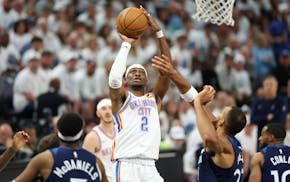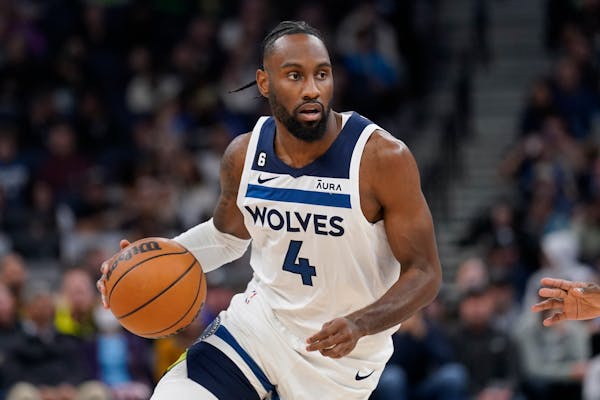The three-point shot was introduced to a sizable audience when the American Basketball Association started in 1967 as a rival league to the NBA.
George Mikan, the Minneapolis Lakers great, was the first ABA commissioner and pushed the idea of a three-pointer.
The 6-10 Mikan saw it as an element that would give the "smaller player" a chance to have more of an impact on the game.
When Terry Pluto wrote his ode to the ABA, "Loose Balls: The Short, Wild Life of the American Basketball Association," Mikan said of the three-ball:
"We called it the home run, because the three-pointer was exactly that. It brought fans out of their seats."
The ABA's distance for the three-pointer for most of the court was 23 feet, 9 inches, which is the NBA's distance today.
Long ago it stopped being a home run — more like a two-out double — and it's not only made threes that bring fans out of their seats.
There are also the misses that cause some in the crowd to stand and shout: "What are you doing taking that shot?"
The three-pointer was introduced to the NBA in 1979. It was such a minor weapon a decade later that league scoring had fallen from an average of 109.2 points per team in 1988-89 to 101.5 in 1993-94.
The NBA decided to use a universal 22-foot distance for a couple of seasons. This convinced coaches to start allowing more threes, and when the distance was returned to 23-9 outside of the corners, teams kept pushing the three.
So, when I suggest the "modern era" of the NBA is designed to drive witnesses crazy with the ebbs and flows, it's a reference to the past quarter-century and the continual devotion to the three — now in the name of "efficiency."
Various numbers floating around, but it's basically based on this: All three-pointers accumulated result in 1.05 points and all midrange jumpers result in .80 points.
This doesn't change my "what's that" reaction from a seat on press row or in front of TV screen when events such as this occur, as was the case Friday night:
The Wolves are leading 105-99 with 1:40 remaining. Kar1-Anthony Towns is hot. There are other passes to be made.
And Anthony Edwards has the ball outside the arc on the left. In an instant, you're certain of this: "The Ant Man is going to hold it for a few seconds and then fire it up."
He stepped back and fired. He missed. The Lakers were alive, but fortunately for the home squad, Troy Brown Jr. stepped on the line on the left sideline as he prepared to shoot a three.
Very soon, Edwards again was firing a three, this time with 1:00 left on the clock. This time, Rudy Gobert saved him with a rebound and foul drawn.
Edwards proved his immaturity — and that's the kindest thing to say about it — with that gay-ridiculing video he decided to share with his social media followers.
And there's ongoing immaturity on the court, often in winning time. Edwards should be using those seconds where he's holding the ball to do what he does best … getting to the basket.
He has remarkable body control on his drives. He doesn't run over defenders in those tightest of quarters; instead, he makes use of an outstanding left hand.
Edwards would rather fire the three, though, which has a greater chance to keep opponents alive in the final minutes than it does to make him the game-clinching hero.
One thing about the Ant: He's always aware of how many points he's sitting on. He missed the second of two free throws with seven seconds left Friday, giving him 29 points, not 30.
Who cares? Well, Anthony did, by the angst-caused smile on his face.
I was talking Wolves with Terry Kunze, a basketball professor if there's ever been one, last spring and he offered this aside that precisely mimicked my view of Anthony:
"Every time Edwards takes a jump shot, I think he's going to miss."
He's actually OK on threes, 35%, but with games still waiting to be won, and him holding the ball on the wing, with that gleam in his eye … aargh!
Edwards is too much of a product of the modern NBA. It's ridiculous that he's taking 44% of his shots from three-point range.
Too bad it isn't still nightly combat, with the three as just a small respite from hard fouls and bad boys, because the Ant with what he does best would've been great at that game.
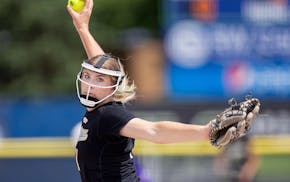
Reusse: As Caswell Park does itself proud, a hometown team runs hard into a challenge
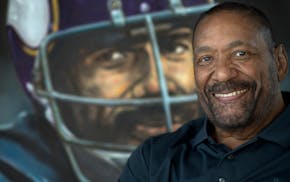
Reusse: Jim Marshall belonged to us, and Minnesota loved him for it

Reusse: Murphy's return will be a fun time on the ice
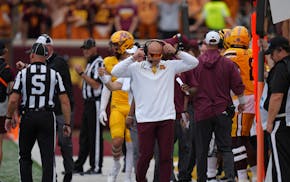
Reusse: Gophers vs. Huskers and an 80th birthday on a fall Friday? Good day to be a homer again
